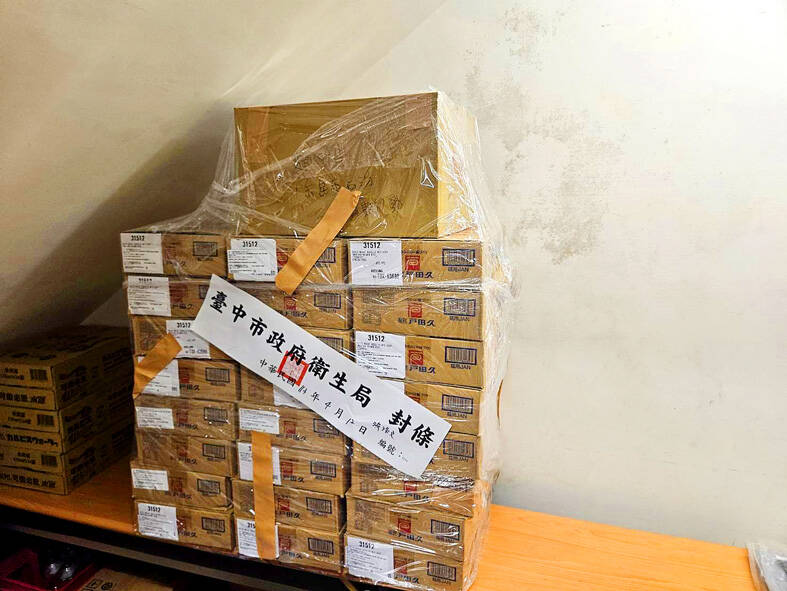The Taichung City Health Bureau yesterday said it would investigate a restaurant’s claim that expired ingredients found in its kitchen were for employee training, after the high-end Japanese barbecue restaurant was on Sunday reported to have allegedly used expired beef and other ingredients.
The Taichung Office of Food and Drug Safety on Sunday confirmed that Wagyu Emperor (和牛Emperor) — which specializes in upscale yakiniku (Japanese grilled meat), with a menu that features a single dinner set for NT$3,900 (US$120.45) — had expired ingredients in its kitchen.
After receiving a tip-off from a former restaurant employee that the grill used expired beef, the office sent personnel to inspect the restaurant on Friday and found expired beef and other ingredients, it said in a statement.

Photo courtesy of Taichung Office of Food and Drug Safety
The expired ingredients included frozen beef, miso, cold noodles and fermented bean paste, some of which were a week to five months past their expiration dates, it said.
The ingredients have been sealed, and after notifying the manager, the restaurant is to be fined NT$60,000 to NT$200 million for contravening the Act Governing Food Safety and Sanitation (食品安全衛生管理法), the office said.
Wagyu Emperor on Sunday night apologized on Facebook for the incident and for having an insufficient understanding of food safety laws and regulations by keeping expired beef in one of its freezers.
It wrote that the expired frozen beef and ingredients were for “employee training to improve service quality,” and that it had kept the expired meat in a separate freezer from the beef served to customers.
“The meat served during opening hours is absolutely not the expired meat mentioned in reports,” it said, adding that media reports were inaccurate, and that it would take legal action against false reporting.
However, Taichung Health Bureau Director Tseng Tzu-chan (曾梓展) said that during its inspection, some expired ingredients were found in areas where ingredients used for cooking were stored, leading inspectors to believe the restaurant was using expired ingredients in its dishes.
The expired ingredients included 18 boxes (219 pieces) of beef (three to five months past expiration), 11 boxes of miso (two to four months past expiration), two bottles each of Japanese and Korean fermented bean pastes (both two months past expiration), 24 boxes and 60 packs of cold noodles (expired by a week), two bottles of sea kelp broth, two bottles of concentrated honey lemonade, and two bottles of concentrated pomegranate drink, he said.
Regarding the restaurant’s claim that the expired ingredients were for “employee training,” Tseng said the bureau would investigate the case for clarification.
“We highly suspect that claim,” he said, adding that it would impose a heavy fine based on each expired item, as well as offer a cash reward to the whistle-blower.

TRAFFIC SAFETY RULES: A positive result in a drug test would result in a two-year license suspension for the driver and vehicle, and a fine of up to NT$180,000 The Ministry of Transportation and Communications is to authorize police to conduct roadside saliva tests by the end of the year to deter people from driving while under the influence of narcotics, it said yesterday. The ministry last month unveiled a draft of amended regulations governing traffic safety rules and penalties, which included provisions empowering police to conduct mandatory saliva tests on drivers. While currently rules authorize police to use oral fluid testing kits for signs of drug use, they do not establish penalties for noncompliance or operating procedures for officers to follow, the ministry said. The proposed changes to the regulations require

The Executive Yuan yesterday announced that registration for a one-time universal NT$10,000 cash handout to help people in Taiwan survive US tariffs and inflation would start on Nov. 5, with payouts available as early as Nov. 12. Who is eligible for the handout? Registered Taiwanese nationals are eligible, including those born in Taiwan before April 30 next year with a birth certificate. Non-registered nationals with residence permits, foreign permanent residents and foreign spouses of Taiwanese citizens with residence permits also qualify for the handouts. For people who meet the eligibility requirements, but passed away between yesterday and April 30 next year, surviving family members

China Airlines Ltd (CAL) yesterday morning joined SkyTeam’s Aviation Challenge for the fourth time, operating a demonstration flight for “net zero carbon emissions” from Taiwan Taoyuan International Airport to Bangkok. The flight used sustainable aviation fuel (SAF) at a ratio of up to 40 percent, the highest proportion CAL has achieved to date, the nation’s largest carrier said. Since April, SAF has become available to Taiwanese international carriers at Taipei International Airport (Songshan airport), Kaohsiung International Airport and Taoyuan airport. In previous challenges, CAL operated “net zero carbon emission flights” to Singapore and Japan. At a ceremony at Taoyuan airport, China Airlines chief sustainability

‘ONE CHINA’: A statement that Berlin decides its own China policy did not seem to sit well with Beijing, which offered only one meeting with the German official German Minister for Foreign Affairs Johann Wadephul’s trip to China has been canceled, a spokesperson for his ministry said yesterday, amid rising tensions between the two nations, including over Taiwan. Wadephul had planned to address Chinese curbs on rare earths during his visit, but his comments about Berlin deciding on the “design” of its “one China” policy ahead of the trip appear to have rankled China. Asked about Wadephul’s comments, Chinese Ministry of Foreign Affairs spokesman Guo Jiakun (郭嘉昆) said the “one China principle” has “no room for any self-definition.” In the interview published on Thursday, Wadephul said he would urge China to